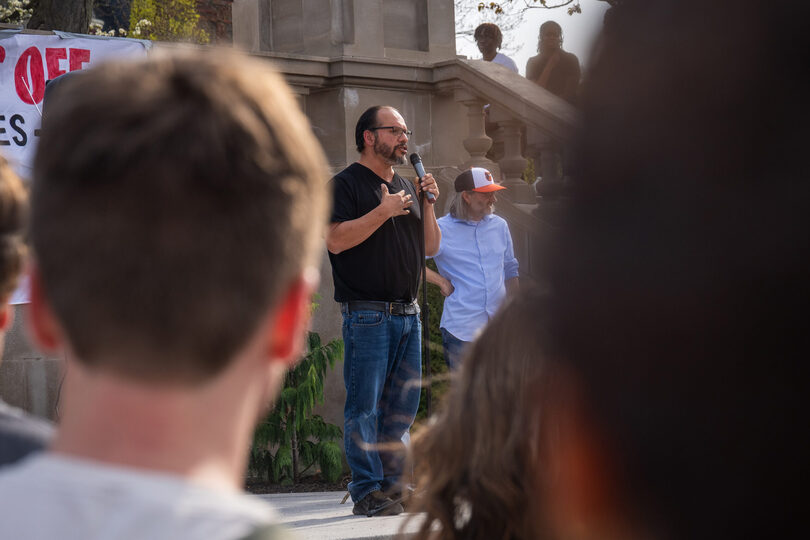Opinion: Concepcion’s DEICER app is revolutionary tool for immigrant community

Our columnist argues professor Rafael Concepcion’s real-time ICE alert app DEICER is a revolutionary tool for immigrants to assert their rights. The peaceful defense system gives needed constitutional guidance for when ICE is present. Collin Snyder | Staff Photographer
Get the latest Syracuse news delivered right to your inbox.
Subscribe to our newsletter here.
UPDATE: This story was updated on Aug. 28 at 12:50 p.m.
Rafael Concepcion is Syracuse University’s former Newhouse DEIA chair and assistant teaching professor.
His passionate drive for seeking solutions to the current administrative persecution of BIPOC immigrant communities models the proactive resistance we need from our leaders.
Yet, he said he felt his role at SU was up in the air following the department’s dismantling.
Back in February, he wrote a powerful guest Opinion piece on Syracuse.com about a Mexican shop in Geneva, N.Y., which had posted a sign offering to deliver groceries to immigrants scared to leave their homes. Concepcion himself volunteered for that role. He advocated for staying true to CNY’s abolitionist history and standing up for immigrants.
Instead of praise, he received death threats and racist backlash from supporters of “rounding up” people who looked like him. He said the comments inspired him to begin work on the first version of the DEICER app, vigia.co, to help immigrant rights and provide tools for safe interactions with authorities.
We must realize the dystopic reality of being ethnically persecuted in Syracuse is as real as ever.Valeria Martinez-Gutierrez, Columnist
Concepcion created the app DEICER (pronounced De-Icer) to protect federally targeted immigrant communities locally and nationwide. The mission of the free app is to transform fear into empowerment through peaceful, informed and multilingual community action in the midst of aggressive deportation tactics.
When the federal administration began revoking visas and deporting people – including students – on the basis of racial profiling, he broadened the vision for DEICER from narrow protection of individual rights to a garden for community solidarity.
It provides real-time alerts about ICE sightings through community reports, giving users the option to be an “observer” and keep an eye out for authorities. Some of the features include constitutional protection, a multilingual AI assistant, a resource community network and digital ID card storage.
Three weeks before the spring semester ended, Concepcion claims he received an email stating his position would be sunsetting, per the provost’s office.
Receiving this notice so late in the semester didn’t make sense to him, he said.
“Something just didn’t seem to add up,” he said, until he saw the email from the chancellor regarding discontinuation of the DEIA office and reinstatement of People and Culture. Then, it clicked.
When I asked Concepcion about the switch, the first words that came to his mind were “exclusionary” and “tone-deaf.”
This is only a symptom of the decaying efforts for inclusion. Even the annual Welcome Week Fête for students of color, which previously had been held on the field of the Women’s Building was switched to Schine Student Center. It feels like we’re being hidden away whilst being told that all is okay.
Concepcion further contextualized his frustration at the “People and Culture” switch with Patrick Buchanan’s 1992 speech at the Republican National Convention, which sparked the “culture wars” debate. The Department of Homeland Security, too, recently posted a recruitment flyer on social media, seeking more ICE agents with the pitch of “serve your country, defend your culture” with, as Concepcion put it, “white in parentheses.”
We must realize the dystopic reality of being ethnically persecuted in Syracuse is as real as ever. Concepcion explained to me the story of a local business owner’s son on Temporary Protected status being detained by ICE, although asserting they had proper documentation and no criminal history.
He was later released with the aid of Concepcion, he said, but with an ankle monitor. Being an immigrant, or simply “looking” like one, isn’t adjacent to being a criminal, and the historic and judicial repercussions of such institutional xenophobia will indubitably linger for decades to come.
Instead of igniting this narrative, be part of its demise.
Anyone can join right from their phones, and Concepcion has worked with artificial intelligence to enhance equity and combat digital redlining. DEICER acts as a nonconfrontational defense system to deter raids before they happen and arm at-risk communities with the tools they need to assert their rights.
His infectious, bleeding heart for justice has driven the development of multifaceted solutions for local and wider involvement with the community that aren’t talked about enough in our classes — are these the kinds of professors we’re willing to put on the line as students?
SU doesn’t exist in a vacuum, nor do our identities as students, teachers and faculty. Acknowledgement, but better yet, leadership, in the fight against erasure is the representation we’ve been institutionally starved of.
Meeting Concepcion reignited my hope and passion that at least some who are in charge of nourishing our minds do care about their role and leverage in these tumultuous times. It’s imperative that SU makes a commitment beyond performative plans to make this a welcoming campus to all, especially faculty taking action against offenses to our campus and city.
We’re living through an ethnic cleanse, and we can’t allow it to occur in the university we pay for in the town we already take advantage of systemically. Immigrant communities aren’t a threat, and the need for apps like this should prove they’re not the villains.
Correction: A previous version of this article did not clarify who retired the Newhouse School of Public Communication DEIA chair position. Though the Newhouse dean communicated the position’s end, it was the provost’s office’s decision. The Daily Orange regrets this error.
Valeria Martinez-Gutierrez is a senior majoring in Geography, Sociology and Environment, Sustainability and Policy. Her column appears bi-weekly. She can be reached at vmarti10@syr.edu




